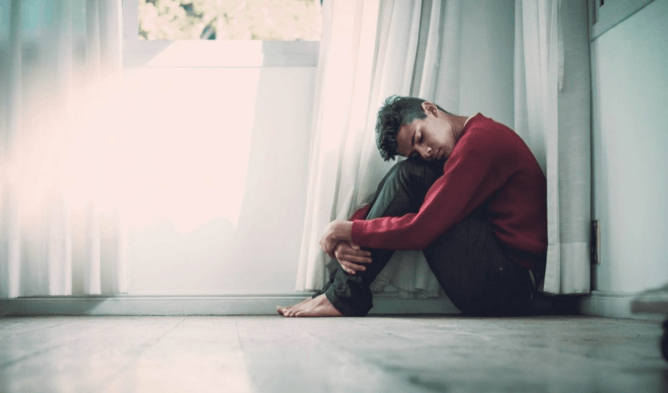While some health experts claim that there is no such thing as anxiety attacks, one can’t erase the fact that it does exist, and it is not unusual to see the terms- panic attack and anxiety attack being used interchangeably.
The fact, however, remains that even though panic attack and anxiety attack do share common symptoms; there are still crucial characteristics that distinguish one from the other.
You can only distinguish between the two if you know the differences.
Anxiety attacks can be said to occur when one has unrealistic and excessive worry over a stretched period, go hand to hand with depression, and it can last for up to 6 months. In comparison, a panic attack appears to be much more severe even though it continues for only a short while.
A panic attack feels different from the feeling you get when you are being excessively worried about life issues. In fact, people that suffer or have suffered from panic attacks usually do not have a specific term to describe it, but one sure thing that can be deduced from their experiences is that panic attacks can be terrifying and physically debilitating.
What is an anxiety attack? What is a panic attack? Let’s explore and take it a step at a time.
Anxiety Attack and Symptoms
The term ‘anxiety attack’ does not exist in the Diagnostic and Statistical Manual of Mental Disorders (DSM), yet people have reportedly experienced it. In fact, according to Dr. Helen Odessky, a Chicago therapist, research shows that 18% of people in the US have been reported to have significant anxiety issues.
The fact that it is not in the DSM; however, leaves it as more of a colloquial term than a clinical term. People use the term to describe an extended and intense period of worry and anxiety.
Deducing from those that suffer from it, an anxiety attack is more intense than the mere feeling of anxiety but less severe than a panic attack at a given episode.
Many patients must have used this term in therapy sessions that physicians, therapists and mental health professionals have started to take due note of it even though it is not yet official.
Anxiety Attack Symptoms in Women
- Restlessness and an edgy feeling
- Easily irritated
- Easily prone to fatigue
- Lack of concentration
- distress
- Excessive worrying and inability to control worries
- Sleep disorders (difficulty falling or staying asleep)
- Tensed muscles
- Personality changes, for example, withdrawal from social activities
Anxiety attacks could present with one or more of the symptoms mentioned above. Since anxiety is the body’s normal way of responding to a stimulus or certain situation, anxiety attack could be said to be a more intense way of showing that emotion.
Remember, stress and anxiety can be a part of a bigger problem, the depression or major depressive disorder. Therefore, you should not take regular anxiety attacks lightly but should seek medical advice.
Panic Attack and Symptoms
Panic disorder is a term used to describe a series of recurrent panic attacks and was officially recognized as a distinct psychiatric disorder about 30 years ago.
Panic attacks usually come as unexpected intense fear in which about 4 out of about 13 symptoms that characterizes panic attacks develop rapidly and gets to its peak within 10 minutes of its onset.
It is easier to define a panic attack since it is a clinical term and has an official definition in the DSM.
According to the DSM, “A panic attack is a sudden episode of intense fear that triggers severe and serious physical reactions when there isn’t a real danger or apparent cause for it.”
Panic Attack Symptoms in Women
- Fast and pounding heart rate
- Sensing an impending doom or danger
- Phobia for death or loss of control
- Shaking and trembling
- Chills
- Sweating
- Sense of choking
- Hot flashes
- Shortness of breath
- Nausea
- An unrealistic feeling
- Abdominal cramps
- Chest pain
- Headache and dizziness
- Numbness and a tingling sensation
Panic attacks usually present with at least four of the symptoms as mentioned above at a time and would last for a short period, say 10-15 minutes.
Sometimes a panic attack could give the sensation of a heartache making its sufferers feel they are under serious and immediate threat.
Differences Between Symptoms of Panic and Anxiety Attacks
Here are some points to note down about panic attack and anxiety attack symptoms.
1. A panic attack usually lasts for a short period while anxiety tends to extend over a more extended period
Once health professionals used to say that the panic attack is acute while anxiety is chronic.
Being acute, however, doesn’t mean it is a walk in the park. For that brief period, it gets a hold of its victim, and it comes with much intense fear, breathlessness, rapid beating of the heart and distress. When this occurs repeatedly, it could then be diagnosed as ‘panic disorder’.
Anxiety attack, on the other hand, is not usually short-lived. It is like that nagging feeling with low and mild symptoms you get that persist over a long period. Worry is a common symptom here, and it is constant, it might be diagnosed as ‘generalized anxiety disorder’ (GAD) or a symptom of Depression.
GAD is excessive anxiety and worry that lasts for more than 6 months.
People with GAD worry a lot. They worry about why their husbands have not called yet, they worry when their kids leave the house, and they worry about just anything even when they are not meant to.
2. Panic attack and anxiety attack usually have different underlying emotions triggering them
It is normal to feel anxious or nervous sometimes, but there are times people let their emotions get the better part of them. At other times, they worry over things that haven’t even occurred yet. That is a sign of anxiety.
With a panic attack, on the other hand, the body responds to an impending danger even if it does not pose a threat to the physical well-being of the person.
A panic attack can be described as extreme fear.
Other social and medical factors that could trigger a panic attack are the ones listed below.
- social phobia (and other phobias)
- stressful job
- heart attacks
- memories of past traumatic experiences
- chronic pain
- caffeine
- drug or alcohol withdrawal
- hypoglycemia (low level of sugar in the blood)
- hyperthyroidism (abnormally high level of thyroid hormone)
- And even mitral valve prolapse.
3. Anxiety reduces physiological activity while a panic attack increases it
Just as it is with fight and flight response, during a panic attack, breathing and heart rate increases. The body releases hormones called epinephrine in readiness to fight off any potential enemy.
However, the case seems to be the reverse with people suffering from GAD as studies show that physiological activities are reduced with excessive worry.
Summary of the Differences Between Anxiety and Panic Attack
It is essential to distinguish between anxiety and panic attacks for better management. Lack of understanding of these terms could make you treat a disorder you don’t actually have.
With its knowledge, you get the appropriate treatment and would also find it easier to develop useful and better-coping skills.
| Symptom severity | Duration | Onset | Clinical disorder? | |
| Anxiety attack | Mild and low | Spans from short to long | Gradual | Not certain, but likely if attacks are regular |
| Panic attack | Intense | Usually short | Abrupt | Yes, if attacks are regular |
Risk Factors for Panic and Anxiety Attacks
Panic attacks and anxiety attacks seem to share similar risk factors.
People that have family members with anxiety or panic disorders are prone to having panic attacks. Also, there tends to be a link that people with anxious personalities are likely to experience panic attacks.
Other risk factors for (panic) attacks include:
- Drug abuse
- Stress with personal and work-life
- Other mental issues like depression
- Past traumatic experience or witness to a traumatic event
- Chronic medical conditions such as heart disease or diabetes
Research confirms that females are more likely to suffer from panic attacks and anxiety attacks than their male counterparts are.
Do Doctors Diagnose Anxiety Attacks?
Because anxiety attack is not defined clinically, your doctor may not really be able to diagnose it (diagnosed by mental health professionals are based on definitions as found in the DSM) or use the term ‘anxiety attack’.
However, the following associated terms can be diagnosed:
- Anxiety symptoms
- Anxiety disorders
- Panic attacks
- Panic disorders
- Depression
However, the good news is, with the symptom present in an anxiety attack, it can be treated.
How To Stop Panic and Anxiety Attacks and Treatment Options?
Treatment option for the two could vary as their symptoms are not the same, but one sure thing is whether you are suffering from anxiety or panic attack, there are effective treatment options available for you.
The commonly used treatment options include:
- Medications like anti-depressants, anti-anxiety drugs and benzodiazepines can help reduce particularly the most severe symptoms
- Therapy, which can help in dealing with the past and development of management techniques.
- Self-help strategies could help you work your way through your management techniques at a pace that works for you. For example, breathing, meditation and mindfulness techniques.
Sometimes depending on the severity of the attacks, it might be necessary to combine two or more of these treatment options for a more effective outcome.
Not to forget, that some exercises we mentioned in the article Best Exercise For Diabetes can help you with anxiety and panic attacks too. Some of the other Diabetes Home Remedies can be useful too.
Do Children Experience Panic and Anxiety Attack?
While it is quite common for children to have phobias about certain things like dogs, clowns, insects, storms and the dark, it is not so common for them to be diagnosed with a panic disorder.
Panic attacks usually come with a sudden feeling of extreme fear accompanied by other physical symptoms like pounding heart, breathlessness and tingling sensation.
With children, they might get the feeling that they are dying or something really terrible is going to happen to them. However, episodes like these are not so frequent in teenagers and are even rarer in younger children.
When children exhibit anxiety behaviors, which is common amongst them, they could exhibit the following physical, emotional and behavioral signs:
- Complaints of headache and stomach aches, without ‘true’ pain.
- Shaking and sweating, especially when they feel intimidated
- Sleeping problems
- Muscle tension
- Excessive crying
- Easily irritated
- Fear of making even minor mistakes
- Worry and fear when dropped off at school, day care, relative’s home etc
- Has frequent nightmares
- Remain silent or withdrawn when expected to work with others
- Refuses to do things without reasons
- Refuses to go to school
- Has regular meltdowns and throws tantrums
If a child exhibit symptoms of a panic attack or anxiety attack, it would be wise and necessary to seek professional help.
There are a number of places to start from such as:
- The child’s school counsellor or psychologist
- The child’s paediatric
- Psychiatrist specialised in children
- The community health centre
- A specialist anxiety hospital or clinic
In Conclusion
Even though panic attacks and anxiety attacks are used interchangeably, they are not the same. They share some similar symptoms, but they are quite different.
While the Diagnostic and Statistical Manual of Mental Disorders, clearly defines a panic attack, it doesn’t recognise the anxiety attack.
Although panic attacks are much more severe and intense than anxiety attacks, both can be distressing and disrupt normal life activities. It is also possible to experience both panic attacks and anxiety attacks at the same time. For instance, worry can lead to anxiety, which can, in turn, culminate in a panic attack.
There is always a need to seek medical help in either case.
Did you know that anxiety could lead to back pain? Follow the link to read about the natural remedies for back pain.










Dear Shani,
I had no idea that panic attacks and anxiety attacks were so different. I’m sure I was just like most people and though they were the same. Thank you for helping to clear that up in such an easy to understand way.
I do wonder though, do you think genetics have anything to do with having anxiety attacks? Can it be an inherited trait or is more developmental?
I read a book about Steve Young and he talked a lot about his struggle with anxiety and it really got me thinking if there was some contributing factor that “made” him that way or if he was just born that way.
Thanks.
Dear Mason,
Thanks for the stopping by and you raised an important question.
Science has some strong evidence to suggest that Generalized Anxiety Disorder or GAD has a moderate hereditary risk. As I noted in the article, regular anxiety attacks can be an early stage of a bigger problem – Major Depression Discorder or MDD, which is also believed to have a genetical association. Other risk factors for anxiety attacks and anxiety disorder include; thyroid disorders, traumatic life events and phobias.
Although some doctors believe a possibility of a genetical involvement in Panic Attacks (Panic Disorder), the scientific evidence is inconclusive and research is still underway. However, evidence exists to suggest that Panic Attacks are common among women than in men. They are also higher in Caucasians compared to the African American, Asians and Latinos.
Anxiety is a common problem. I believe it is one of those diseases underdiagnosed as people tend to ignore the symptoms until it progressors to Major Depressive Disorder.
Hope this helps.
Great article and it is true. My wife has anxiety, it is nothing to compare with a panic attack. She always has it when it’s about hospitals, or when she feels bad. You’ve explained the things very good, lets hope that more people will understand the différents about these 2 now.
Thanks for sharing it.
Anxiety Attack and Panic Attack, you have put the dividing line as you enumerated that panic attack is a short episode and intense while anxiety attack is slow and gradual and not as intense as a panic attack but all the same both could have a high debilitating effect. A panic attack is a dangerous episode because it could lead to a more medical disorder.
I believe the causes are part of modern life. Specifically, the so-called stresses happening in the workplace and the daily grind of going to and from different activities always coping with skeds and commitment. Not to mention the menacing nature of some evil individuals who inflict abuses and harassment. The lack of a strong support system coming from family or friends. But today relations are characterized by lack of rapport, weak concerns neglect and more on work rather than concerns on the well being of loved ones. It is a painful experience for people who do not have daily support who could be there and calm the nerves and the mind. It is the curse of today’s modern living. It is more pronounced in urban areas rather than with people surrounded by family and friends.
I am enlightened even more on the difference of the two and the symptoms are rather pointed and clear as I saw it to my own experience.
Thanks for adding such valuable insight.
You are correct; both panic attacks and anxiety attacks can lead to severe forms of medical disorders.
We can not agree more about your explanation of the contributing factors to panic and anxiety attacks. You have nailed it.
If you need any specific questions requiring answers, please don’t forget that we are a Click Away.
Best wishes.
Your article is very informative and has a lot of information. It is very well written. I learned a lot about both types of attacks even though one isn’t “official”.
I know personally, that anxiety issues can hurt for a long time, and sometimes the cause is unexplainable. You feel like there is something in the back or your head telling you something isn’t right, even when there is nothing wrong.
Overall this is an excellent article.
-Mike
Hi Shani,
Thanks for bringing out the clear difference between an anxiety attack and panic attack as we assumed both as same or could not identify them separately at all. You have beautifully explained the difference through the table – which made it too easy.
I never knew that even children may have these issues. The symptoms you shared seems normal to the growing child, I will definitely have a close watch from now on, as it needs to be checked at the initial stage itself.
Warm Regards,
Gaurav Gaur
Thanks for this analysis. When I came across this topic, the first question that came up to me was that, can panic attack result to memory loss? I have seen an incidence about this situation before. The victim happened to be a man at 65 that usually fight hard to combacting this situation. Most time, he usually gets panicked anytime he sees something that have to do with life threatening but find it very difficult to explained to the people anytime he is asked. Does that mean a memory loss caused this effect or panic attack caused the memory loss?
I also used to be a victim of panick attack. This usually come up anytime I am going for competition to represent my school when I was still very small. This is the fear of failure. It doesn’t affect me physically but I don’t like the reaction that used to attached to my emotions and it usually limit my confidence. Can we also refer it to anxiety? I overcome it when I started thinking positively about myself. Sometimes, the feeling for both panick and anxiety attack is similar. What did you think about that?
Hi Stella,
Thank you for sharing your experiences and concerns related to panic attacks and anxiety. I’ll address your questions and observations below:
1. Can Panic Attacks Result in Memory Loss? While panic attacks can be distressing and overwhelming experiences, they typically do not result in memory loss. During a panic attack, individuals may experience intense physical and emotional symptoms, such as rapid heartbeat, shortness of breath, sweating, trembling, and a sense of impending doom or fear of losing control. However, memory loss is not a common symptom associated with panic attacks. If memory loss is occurring alongside panic attacks in the case you mentioned, it’s essential for the individual to consult with a healthcare professional to rule out other potential underlying causes.
2. Fear of Life-Threatening Situations and Difficulty Explaining Panic Attacks:
The difficulty in explaining panic attacks might be related to the individual’s emotional distress during these episodes. Panic attacks can be challenging to articulate, especially when the person is experiencing intense fear and anxiety. It’s not necessarily indicative of memory loss, but rather a result of the overwhelming emotional response during the panic attack.
3. Fear of Failure and Panic Attacks:
The fear of failure and experiencing panic attacks in response to competitive situations can be related to anxiety. Anxiety is a broader term that encompasses various conditions, including panic disorder. Panic attacks can be a specific manifestation of anxiety, often characterized by sudden and intense fear or discomfort. In your case, the fear of failure triggering panic-like symptoms suggests that anxiety might be playing a role. It’s great to hear that you were able to overcome these feelings by thinking positively about yourself. Positive thinking and cognitive strategies are valuable tools in managing anxiety.
4. Similarity of Panic and Anxiety Attack Feelings:
It’s not uncommon for panic attacks and anxiety attacks to share similar symptoms and feelings, as they are closely related. Anxiety attacks are often marked by a more prolonged period of heightened anxiety and worry, while panic attacks are characterized by intense and sudden surges of fear. However, both can lead to physical sensations like a racing heartbeat, sweating, trembling, and emotional distress.
It’s important to remember that everyone’s experience with panic attacks and anxiety may vary. While some individuals may experience distinct differences between the two, others might find the feelings and symptoms to be more similar. Seeking support from a mental health professional can be beneficial in understanding and managing these experiences effectively.
If you or someone you know is dealing with panic attacks, anxiety, or any emotional distress that affects daily life, it’s advisable to consult with a qualified mental health professional. They can provide a proper evaluation, offer guidance on coping strategies, and develop a personalized treatment plan to address specific needs.
Thank you for your thoughtful questions, and I hope this response provides some clarity. If you have any further inquiries or need more information, please don’t hesitate to ask.
Take care!
Wow,I got a deep understand about panic attack and anxiety attack with the differences,symptoms and factors responsible for such in a person’s life.l agreed with all the points mentioned. Let me ask this question is it possible for man to quickly forget panic attack after surviving it? Thanks for this great article.
Hi Abayomi,
I’m glad to hear that the article provided you with a deep understanding of panic attacks and anxiety attacks, including their differences, symptoms, and contributing factors. It’s essential to have accurate information about these conditions to promote awareness and understanding.
Regarding your question about whether it is possible for someone to quickly forget a panic attack after surviving it, the answer can vary from person to person. After experiencing a panic attack, individuals may have different reactions and responses. Some people may have a relatively quick recovery and move on from the episode without dwelling on it, while others may find it more challenging to forget or shake off the experience.
Here are a few factors that can influence how someone may respond to and remember a panic attack:
1. Severity of the Panic Attack: The intensity and severity of the panic attack can play a role in how the person remembers it afterward. If the panic attack was particularly distressing or debilitating, it may leave a stronger impression in the person’s memory.
2. Frequency of Panic Attacks: For individuals who experience frequent panic attacks, they may become more accustomed to the experience over time, making it less overwhelming and easier to move on from.
3. Coping Skills and Support: People with effective coping skills and a strong support network may find it easier to process and move past the panic attack.
4. Psychological Resilience: Individual differences in psychological resilience can also impact how someone processes and forgets a panic attack. Resilient individuals may bounce back more quickly from stressful events.
5. Underlying Anxiety or Panic Disorder: If someone has an underlying anxiety or panic disorder, they may have a heightened awareness of their panic attacks and may be more likely to remember them.
It’s important to note that while some individuals may quickly forget a panic attack, others might experience lingering effects, such as heightened anxiety or fear of future attacks. It’s essential for those who experience panic attacks to seek professional help if needed, as a mental health professional can provide guidance on coping strategies and offer support.
If you or someone you know is struggling with panic attacks or anxiety, consider reaching out to a qualified mental health professional for evaluation and personalized treatment. Early intervention and appropriate support can lead to effective management and improved quality of life.
Thank you for your question, and I hope this response helps provide further insight into the aftermath of panic attacks. If you have any more questions or need additional information, feel free to ask.
Take care!
Hi
That was an interesting article as I never really knew about the difference between a panic attack and an anxiety attack. As you say there is a clear difference between the two, and it is more important what the patient feels and not the doctor’s experience. It is amazing how dismissive doctors can be, instead of helping the patient they can make it worse.
I believe it is difficult to treat both conditions but panic attacks more so, as we need to develop coping techniques. This is easier said than done, but we all have inner strength and will help with family, lovers and professionals these debilitating conditions can be overcome. The cry for help needs to be answered.
Do you think it is more important to use a drug approach or more important to use a talking approach or a combination of the two?
Thank you for that interesting article.
Antonio
Hello Antonio,
Thank you for your feedback, and I’m glad you found the article on the difference between panic attacks and anxiety attacks interesting and informative. It’s essential to raise awareness about these conditions to help individuals better understand their experiences and seek appropriate support.
Regarding your question about the treatment approach for panic attacks and anxiety attacks, it’s important to note that each person’s response to treatment can vary, and there is no one-size-fits-all approach. The choice of treatment depends on the individual’s specific symptoms, severity of the condition, and their preferences. In many cases, a combination of different approaches can be beneficial.
Here are some common treatment options:
1. Cognitive-Behavioral Therapy (CBT): This type of talk therapy is a widely used and effective approach for both panic attacks and anxiety attacks. CBT helps individuals identify and change negative thought patterns and behaviors that contribute to their symptoms. It equips them with coping techniques and tools to manage anxiety and panic effectively.
2. Medications: In some cases, medications may be prescribed to help manage symptoms, especially for those with severe or chronic anxiety or panic disorders. Antidepressants and anti-anxiety medications are commonly used. However, medication should be carefully monitored and prescribed by a qualified healthcare professional, as they may have side effects and potential interactions with other medications.
3. Relaxation Techniques: Learning and practicing relaxation techniques, such as deep breathing exercises, mindfulness, or progressive muscle relaxation, can be valuable in reducing anxiety and preventing panic attacks.
4. Lifestyle Changes: Adopting a healthy lifestyle that includes regular exercise, proper nutrition, adequate sleep, and minimizing stress can contribute to overall well-being and help manage anxiety.
5. Support Network: Engaging with supportive family members, friends, or support groups can be an essential part of the recovery process. Talking to others who understand your experiences can be comforting and encouraging.
6. Exposure Therapy: For specific phobias or anxieties related to certain situations, exposure therapy may be used to gradually confront and desensitize the individual to the feared situation.
Ultimately, the choice of treatment should be made collaboratively between the individual and their healthcare provider, considering the person’s unique circumstances and preferences. It’s essential to seek professional help from a qualified mental health professional who can provide an accurate diagnosis and develop a tailored treatment plan.
Remember, overcoming panic attacks and anxiety attacks may take time and effort, but with the right support and treatment, many individuals can achieve significant improvement and lead fulfilling lives.
If you or someone you know is experiencing anxiety or panic attacks, don’t hesitate to reach out for help from a mental health professional or a healthcare provider. They can provide guidance and support on the most appropriate treatment options.
Thank you again for your comment and for bringing attention to this important topic. If you have any more questions or need further information, feel free to ask.
Take care!
Anxiety and panic attacks are definitely not the same… I have been experiencing high levels of anxiety throughout my entire life but I have only had just a few panic attacks here and there, usually a lot of years apart.
A panic attack is so intense and uncontrollable… Sometimes once a panic attack starts then you get panicked because of the panic attack and then the symptoms intensify. It’s like a vicious circle.
Anxiety is more controllable and you can even regulate it with some mindful breathing.